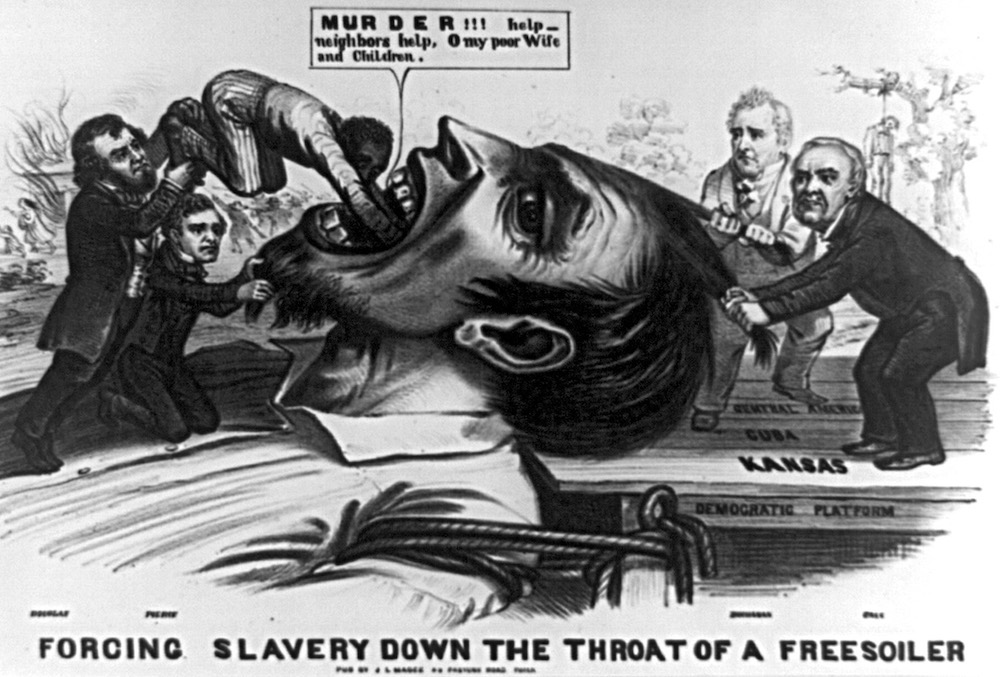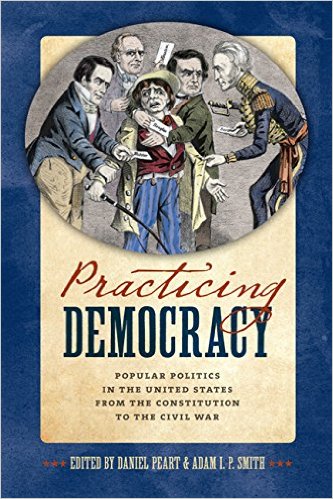Essays, Articles, and Reviews
I have written a number of short pieces. Those available online have links below.
"the 'Little Giant' who thought that backing slavery would unite America"
Zocalo Public Square (February 15, 2018)
This short magazine piece explores Stephen A. Douglas' intentions in 1854, when he made the momentous decision to organize Nebraska Territory. Douglas sought to end conflict over slavery's expansion in America by permitting territorial settlers to determine the fate of slavery in national territories, a policy he called "popular sovereignty." Entrusting the decision to the settlers promised to defuse explosive debates over slavery's expansion in Congress, and thus protect the Union. Yet enacting Douglas' policy required repeal of a long-standing prohibition on slavery in those territories, and set off a massive firestorm that forever changed American politics.
"in the throes of democracy," in Gettysburg Replies
Lyons Press (2015), 142-143.
This unusual book includes 100 essays of exactly 272 words in length, the precise length of the Gettysburg Address. The contributors include five living presidents, a Supreme Court justice, Steven Spielberg, Alan Dershowitz, and a host of other distinguished Americans. I was honored to participate. The reflections are inspiring, touching on many aspects of American and global society. I emphasized the unfinished work of liberty. Our generation, like Lincoln's, suffers from a "tentative, incomplete, and unrealized human commitment to freedom" that "calls out insistently, everywhere, for new birth in service of human dignity." All proceeds from the book go to support the Abraham Lincoln Presidential Library Foundation. Host Phil Ponce interviewed the foundation's CEO, Carla Knorowski, and I, on WTTW's Chicago Tonight shortly after the book was published. To watch the interview, click here.
"Was There a Second Party System? Illinois as a Case Study in Antebellum Politics"
University of Virginia Press (2015), 145-169.
This essay challenges historians' assumption of the existence of a Second Party System characterized by stable voter blocs for the Whig and Democratic parties in the 1840s and 1850s. Instead, it contends that antebellum politics was issue driven, with voters responding to the introduction of new issues. Banking was a critical issue in the 1830s, national expansion in the 1840s, and slavery in the 1850s. Illinoisans' experience thus suggests that voter loyalties were more uncertain during the antebellum years than historians have traditionally assumed.
"How Moderate Were the Moderates? Reconsidering the Origins of the Republican Party in Illinois"
Journal of Illinois History 17 (Autumn 2014): 158-182.
This article reinterprets the role of moderate antislavery politicians such as Abraham Lincoln, Richard Yates, and Lyman Trumbull in the formation of the Illinois Republican Party. It contends that the moderates' conviction that freedom should be national brought them into ideological alliance with abolitionists like Elijah Lovejoy and Ichabod Codding. By emphasizing the significance of antislavery sentiment to the early Republican Party, the essay challenges the traditional story that moderates like Lincoln pushed radical antislavery leaders like Lovejoy to the background when the party took shape in 1856.
"new records of the Lincoln-Douglas debate at the 1854 Illinois state fair: the Missouri Republican and the Missouri Democrat report from Springfield"
Journal of the Abraham Lincoln Association 30 (Summer 2009): 25-80.
This article introduces long-forgotten records of a famous forensic dual in Springfield, Illinois, between Abraham Lincoln and Illinois Senator Stephen A. Douglas. Challenging Douglas to defend the Kansas-Nebraska Act of 1854, which struck down a congressional law prohibiting territorial slavery, Lincoln argued that the act was morally indefensible because it undermined the nation's commitment to freedom. Douglas replied that freedom included the right to choose slavery--that freedom of choice is the basis of democracy. Lincoln implored Americans to reject this definition, eloquently arguing that human equality is the foundation of democracy.
"Abraham Lincoln and the triumph of An Antislavery Nationalism"
Journal of the Abraham Lincoln Association 28 (Summer 2007): 1-27.
This article argues that Abraham Lincoln's use of nationalism played a critical role in mobilizing northerners against slavery. Although abolitionism had long been criticized in the North as a radical and disorganizing crusade hostile to the Union, Lincoln successfully portrayed antislavery politics as a conservative defense of freedom and economic opportunity. He insisted that the founders had dedicated the nation to freedom, and had preserved the Northwest Territories from slavery in order to ensure freedom's eventual triumph. Lincoln's nationalist portrayal of the antislavery movement marginalized northerners who sought to protect slavery, most notably his Illinois rival Stephen A. Douglas. Claiming that the founders had made the country half slave and half free, Douglas insisted that slavery could exist in the United States forever. The triumph of Lincoln's nationalism in the election of 1860 profoundly threatened slaveholders, whose equally adamant conception of a proslavery nation spurred them to secede.
"was Stephen a. Douglas antislavery?"
Journal of the Abraham Lincoln Association 26 (Summer 2005): 1-21.
Scholars have been divided in their estimation of whether Stephen A. Douglas was antislavery. The question is a difficult one because Douglas never advocated slavery, as did most southerners, but he also never criticized it, as did most northerners. He did imply that slavery was wrong and undesirable, but he resolutely defended slaveholders' rights throughout his career. This article reassesses the work of prior historians, analyzes the primary sources that illuminate Douglas' attitudes toward slavery, and argues that Douglas should be considered moderately proslavery.
book reviews, Encyclopedia entries, teaching articles, and other writing
Review of Sovereign of a Free People: Abraham Lincoln, Majority Rule, and Slavery, by James H. Read. In the Journal of the Abraham Lincoln Association, forthcoming.
Review of Lincoln and Native Americans, by Michael S. Green. In the Journal of the Illinois State Historical Society, forthcoming.
“University of Illinois Springfield Places Innovative Lincoln Teacher Modules Online," Lincoln Forum Bulletin 55 (Spring 2024): 9.
Review of Young America: The Transformation of Nationalism before the Civil War, by Mark Power Smith. In The Journal of Southern History 90 (May 2024): 429-430.
"‘Making Our History’: Illinois Artists Render Lincoln’s Legacies in Stunning Exhibit in Springfield," Lincoln Forum Bulletin 52 (Fall 2022): 14-15.
“Extending the Hand of Democracy.” Review Essay of A House Built by Slaves: African American Visitors to the Lincoln White House, by Jonathan W. White, To Address You As My Friend: African Americans’ Letters to Abraham Lincoln, ed. Jonathan W. White, and His Greatest Speeches: How Lincoln Moved the Nation, by Diana Schaub. In Journal of the Abraham Lincoln Association (Fall 2022): 79-84.
Review of Arguing until Doomsday: Stephen Douglas, Jefferson Davis, and the Struggle for American Democracy, by Michael E. Woods. In Journal of the Abraham Lincoln Association 42 (Fall 2021): 89-93.
Review of Owen Lovejoy and the Coalition for Equality: Clergy, African Americans, and Women United for Abolition, by Jane Ann Moore and William F. Moore. In The Annals of Iowa 79 (Fall 2020): 375-376.
Review of Preserving the White Man’s Republic: Jacksonian Democracy, Race, and the Transformation of American Conservatism, by Joshua A. Lynn. In The Historian 82:3 (2020): 368-369.
“Abraham Lincoln and the Making of an Antislavery Nation,” Academe Blog: The Blog of Academe Magazine, October 22, 2020.
Review of The Forgotten Emancipator: James Mitchell Ashley and the Ideological Origins of Reconstruction, by Rebecca E. Zietlow. In The Journal of the Civil War Era 9 (March 2019): 166-68.
Review of Lincoln’s Sense of Humor, by Richard Carwardine. In Reviews in History, #2255 (Summer 2018).
Review of Northern Men with Southern Loyalties: The Democratic Party and the Sectional Crisis, by Michael Todd Landis. In American Nineteenth Century History, 16 (May 2015): 228-230.
Review of Slavery, Race, and Conquest in the Tropics: Lincoln, Douglas, and the Future of Latin America, by Robert E. May. In Journal of the Illinois State Historical Society 107 (Fall/Winter 2014): 402-403.
Review of A Self-Evident Lie: Southern Slavery and the Threat to American Freedom, by Jeremy J. Tewell. In Journal of Southern History, 80 (August 2014): 712-713.
Review of Stephen A. Douglas and Antebellum Democracy, by Martin H. Quitt. In Journal of the Illinois State Historical Society, 106 (Autumn-Winter 2013): 499-501.
Review of Crusade Against Slavery: Edward Coles, Pioneer of Freedom, by Kurt E. Leichtle and Bruce G. Carveth. In Ohio Valley History 12 (Summer 2012): 85-86.
Authored a miniature book, The Lincoln-Douglas Debates in Miniature, for the Stephen A. Douglas Association, 2012
Review of Slavery, Capitalism, and Politics in the Antebellum Republic, Volume 2: The Coming of the Civil War, 1850-1861, by John Ashworth. In American Nineteenth Century History, 12 (March 2011): 101-103.
Review of Stephen A. Douglas and the Dilemmas of Democratic Equality, by James L. Huston. In Indiana Magazine of History 104 (December 2008): 405-407.
Review of Governor Edward Coles and the Vote to Forbid Slavery in Illinois, 1823-1824, by David Ress, Frontiers of Freedom: Cincinnati's Black Community, 1802-1868, by Nikki M. Taylor, and The Black Laws: Race and the Legal Process in Early Ohio, by Stephen Middleton. In Journal of the Early Republic 27 (Winter 2007): 777-783.
Review of The Fate of Their Country: Politicians, Slavery Extension, and the Coming of the Civil War, by Michael F. Holt. In H-CivWar (January 2007).
“Stephen Arnold Douglas (1813-1861).” The American Midwest: An Interpretive Encyclopedia, eds. Richard Sisson, Christian Zacher, and Andrew Cayton, 1629. Bloomington and Indianapolis: Indiana University Press, 2007.
"Stephen A. Douglas and the Northern Democratic Origins of the Kansas-Nebraska Act." Illinois History Teacher 10 (Winter 2003): 2-7.
Review of Patriot Fires: Forging a New American Nationalism in the Civil War North, by Melinda Lawson. In Journal of Illinois History 8 (Summer 2005): 174-75.
Review of The Invention of Party Politics: Federalism, Popular Sovereignty, and Constitutional Development in Jacksonian Illinois, by Gerald Leonard. In Journal of the Early Republic 23 (Fall 2003): 461-464.
Review of The Birth of the Grand Old Party: The Republicans' First Generation, by Robert F. Engs and Randall M. Miller, eds. In Civil War History 49 (Fall 2003): 299-300.
Review of Escape Between Two Suns: A True Tale of the Underground Railroad in Illinois, by Carol Pirtle. In Journal of Illinois History 4 (Summer 2001): 171-172.
Review of The Great Silent Army: Ordinary Women in the Antislavery Movement, by Julie Roy Jeffrey. In Journal of Illinois History 2 (Summer 1999): 157-58.
"Robert Hewson Pruyn." American National Biography, vol. 17, eds. John A. Garraty and Mark C. Carnes, 914-15. New York: Oxford University Press, 1999.
"Wilson Shannon." American National Biography, vol. 19, eds. John A. Garraty and Mark C. Carnes, 712-13. New York: Oxford University Press, 1999.
Review of Yankee Town, Southern City: Race and Class in Civil War Lynchburg, by Stephen Elliot Tripp. In Civil War History 44 (June 1998): 160-161.
Review of Stephen A. Douglas, by Robert Johannsen. In Illinois History Journal 91 (Spring 1998): 60-61.






